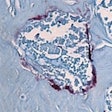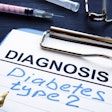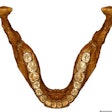
Our primal ancestors generally had healthy mouths. How could that be? They never brushed their teeth with commercial chemical toothpastes. They never flossed with manufactured cotton string. And they never went to their neighborhood dental cave to get fluoride treatments.
 Dr. Alvin Danenberg.
Dr. Alvin Danenberg.But our primal ancestors also had different eating habits, including the following:
- They didn't eat junk foods, processed foods, or chemical additives.
- They consumed a high percentage of animal protein and animal fat.
- They ate low to moderate amounts of healthy carbohydrates occasionally.
Basically, our primal ancestors ate a healthy diet -- one full of bioavailable nutrients. They benefited from the connection between oral health and diet, so they generally had healthy teeth and healthy gums. Their diet was the main factor that created a balance of healthy bacteria in the gut, a healthy gut lining, and a balance of healthy bacteria in the mouth.
Peer-reviewed papers show how diet affects oral health
Millenia after the stone age, peer-reviewed medical papers are uncovering just how much diet can impact the health of the mouth. Below are three papers on that very topic.
Study 1: The impact of the stone age diet on gingival conditions in the absence of oral hygiene (J Periodontol, May 1, 2009, Vol. 80:5, pp. 759-768)
In 2009, Dr. Stefan Baumgartner led a study set in Switzerland. In this controlled experiment, 10 individuals were not able to brush or floss for 30 days. Their diet consisted of primal foods endemic to their specific area in Switzerland about 5,700 years ago. No processed foods were available. These participants had to gather and forage for most of their food.
At the beginning and end of the study, researchers measured the gum space between the teeth and the degree of bleeding. Cultures of bacteria were also taken from the dental plaque around the teeth and from the tongue.
After the experiment, the researchers were surprised with the results. Participants experienced a significant decrease in bleeding in the gum tissue and a significantly healthier gum space around the teeth. Amounts of dental plaque increased greatly, but pathogenic bacteria did not increase either in the plaque or on the tongue. Dental plaque and other oral microbes were in a state of balance at the end of the four-week experiment.
Bottom line: A diet that completely removes overprocessed foods reduces the signs and symptoms of gum disease. This type of diet allows the interactions of bacteria in dental plaque to become and stay balanced and healthy.
Study 2: An oral health optimized diet can reduce gingival and periodontal inflammation in humans -- a randomized controlled pilot study (BMC Oral Health, July 26, 2016, 17, e28)
In 2016, Dr. Johan Woelber and colleagues performed a randomized clinical trial. Only people who had signs of gum disease and were eating a diet heavily based on processed carbohydrates were selected for the study. The group enrolled 15 participants: 10 in the experimental group and five in the control group.
As far as oral hygiene was concerned, all 15 participants were instructed not to clean between their teeth with dental floss or interdental brushes. However, they did not have to change the way they brushed their teeth with a toothbrush.
The experimental group also had to change their diet to one that consisted of foods low in processed carbohydrates, rich in omega-3 fatty acids, and abundant in vitamins C and D, antioxidants, and fiber. The control group was instructed to not change their eating habits.
Signs of gum disease were recorded at the start of the four-week study and at the end. At the conclusion of the trial, all disease parameters decreased significantly in the experimental group by approximately 50% from the starting point. In contrast, in the control group, all inflammatory markers increased from the starting point.
Bottom line: A diet that eliminates free sugars and processed grains and includes healthy foods can reduce the signs and symptoms of gum disease. Therefore, a healthy diet can maintain dental plaque in a healthy state.
Study 3: Diet and dental caries: The pivotal role of free sugars reemphasized (J Dent Res, October 2015, Vol. 94:10, pp. 1341-1347)
In a paper published in 2015, Dr. Sheiham and an associate reported on the pivotal role of free sugars in dental decay. The paper evaluated many previous research studies and came to the following conclusions:
- Dental decay is diet mediated.
- Free sugars are primary and necessary factors to develop dental decay.
- Acid-producing bacteria and other factors facilitate the development of decay, but free sugars are required.
- Processed food starches possess very low decay potential.
Free sugars include all sugars added to foods in any way. Free sugars cause an imbalance of gut bacteria, compromise the immune system, and feed decay-producing bacteria in healthy plaque. Healthy plaque then becomes unhealthy plaque. Free sugars also allow potentially pathogenic bacteria to overgrow and produce excessive acids that cause tooth decay.
Bottom line: Dental caries is a diet-mediated disease. Free sugars are the primary and necessary factors in the development of dental decay.
Is keto the key?
Based on their healthy diet full of bioavailable nutrients, our primal ancestors most likely were in a state of dietary ketosis most of the time but still cycled out of ketosis when their level of carbohydrates increased.
Dietary ketosis -- also known as physiologic ketosis, or nutritional ketosis -- is a healthy metabolic state in which your body burns fat instead of carbohydrates for fuel. It creates a clean energy source for the body and reduces the inflammation caused by eating a diet high in carbohydrates.
Ketosis is characterized by elevated serum ketones and normal blood glucose and blood pH. In dietary ketosis, blood ketone levels generally remain between 0.5-3 mmol/L. You can get into ketosis through methods that increase the breakdown of fatty acids by the liver, including through fasting, prolonged exercise, or a high-fat/moderate protein/low-carbohydrate way of eating.
Ketosis has numerous health benefits, but most importantly, it allows for a healthy gut microbiome and a healthy gut lining, which improves the immune system. A robust immune system helps maintain a healthy and diverse garden of microbes in the mouth. With a balanced oral microbiome, tooth decay and periodontal disease hardly ever become a problem.
But our bodies are not designed to stay in ketosis forever. Our metabolism needs to cycle out of ketosis and burn carbs cyclically to improve insulin metabolism, which allows for metabolic flexibility.
If you or your patients are experiencing issues with your dental health, look at the diet first and then at other environmental factors. The takeaway for us is that we can mimic the ancestral way of eating as well as avoid toxic elements to maintain our gut and dental health. Eating this type of high-fat diet can do wonders for your mouth, brain, and entire body.
Dr. Alvin Danenberg has retired from the private practice of periodontics in Bluffton, SC. He continues to be on the faculty of the College of Integrative Medicine and created its integrative periodontal teaching module. He also spent two years as chief of periodontics at Charleston Air Force Base earlier in his career. His website is drdanenberg.com.
The comments and observations expressed herein do not necessarily reflect the opinions of DrBicuspid.com, nor should they be construed as an endorsement or admonishment of any particular idea, vendor, or organization.


















